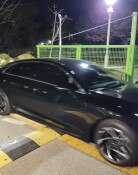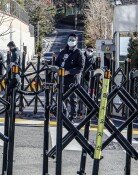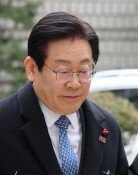Taxpayers in Uproar over Aggregate Land Tax Hike
Taxpayers in Uproar over Aggregate Land Tax Hike
Posted October. 14, 2004 23:21,
On the afternoon of October 14, the five telephone lines of the Paju City Hall Municipal Tax Department were tied up throughout the day. This was because ever since October 12, taxpayers who received their aggregate land tax papers have been protesting.
The public officer in charge of aggregate land taxes said, There have been over 250 calls a day inquiring about aggregate land taxes, and that, We cannot attend to other affairs.
The total amount of aggregate land tax that Paju City has imposed is over 12.8 billion won. This is a 48.8 percent increase from last years amount. This is because last years individual publicized market price, the standard for imposing the rate of aggregate land tax, has increased by 20.2 percent from 2002, and the application ratio of the taxation standard has increased by five percentage points.
In an industrial area of Moonbal-ri, Gyoha-eup, Paju, which was originally a field, now imposes an aggregate land tax of 227,000 won, a 144 percent increase from last years 93,000 won.
Mrs. Kim, a housewife who lives in Seocho-dong, Seocho-gu, Seoul, said, The aggregate land tax bill that was 80,000 won last year is 130,000 this year, and added angrily, This year, the property tax increased by three times the original amount. How will people live if they raise the aggregate land tax on top of that?
In Songpa, Seocho, Gangnam-gu, the so-called Seoul Gangnam area, the aggregate land tax per capita has increased by 40,000 won since last year. Because of this, there are concerns about taxpayers tax resistance related to the aggregate land tax increase in addition to recent objections over property tax increases, which mainly occurred in the metropolitan area.
Nationwide, the aggregate land tax has increased by an average of 28.3 percent since last year. This is the largest increase since the aggregate land tax was implemented in 1990.
Goh Seong-ha (58), chairperson of the Bundang Residents Council in Sungnam, Gyeonggi Province, said, By imposing a property tax, the rise in the price has already been accounted for. The increase in aggregate land tax is double taxation, and that, After we collect the opinions of tenant representatives, we are planning to respond to the situation together.
However, a person associated with the Ministry of Government Administration and Home Affairs (MGAHA) said, In the case of property taxes, the mayor or county governor can add or subtract the standard tax rate within a 50 percent limit, but for aggregate land taxes, there are no such regulations, so the local government body or local assembly will not be able to reduce or exempt taxes.
A person associated with tax affairs in Gangnam-gu, Seoul explained, An increase in the possession tax because the price of land has increased is a rare example of tax administration, and the resistance of taxpayers is inevitable, adding, It is frustrating that nevertheless, we must impose taxes in line with MGAHA regulations.
According to current local tax laws, taxpayers who believe that the increase in taxes is excessive can submit a formal objection to their corresponding city or district tax affairs department within 90 days of receiving their tax papers.
Also, they can request screening of their taxes by the provincial government or MGAHA. They can also lodge an administrative litigation case without going through the formal objection or a screening process.
To reduce the tax burden, the aggregate land tax is imposed on a portion of the total individual publicized market price; this rate is called the application rate for the taxation standard. If the publicized market price is one million won and the application rate is 40 percent, then the aggregate land tax is imposed on only 0.4 million won.
The government is planning to increase the application rate to 50 percent by 2006. The current national average application rate is 39.1 percent.
Jae-Myoung Lee Tae-Hun Hwang egija@donga.com beetlez@donga.com







